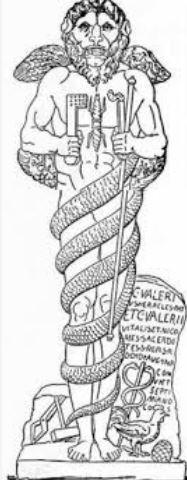Sakla

The term "Sakla" in connection with Gnosis and the Demiurge is a reference to certain Gnostic concepts that exist in ancient religious and philosophical traditions. These terms often appear in the context of Gnostic schools of thought, which hold a mystical and dualistic view of the universe.
1. Sakla (or Saklas):
In Gnosticism, the name Sakla is frequently used to refer to the Demiurge. The Demiurge is a central concept in many Gnostic teachings, who created the world but is often viewed as an inferior or "false" being.
Sakla is often a name that appears in Gnostic writings, such as the texts of the Nag Hammadi Library. In some Gnostic traditions, Sakla is described as a type of Demiurge who created the physical universe, but in a state of ignorance or even arrogance and evil. In some Gnostic writings, he is portrayed as a "blind" or "stupid" god who created the world without knowing the true divine source.
2. Gnosticism:
Gnosticism is a religious and philosophical movement popular between roughly the 2nd and 4th centuries AD. Gnostics believe that true knowledge (gnosis) is the only way to transcend the material body and the physical world and unite with the higher, true God.
Gnostic teachings are characterized by a strong distinction between the material world and the spiritual world. The material world is often viewed as a mistake or illusion created by a lower being, the demiurge.
3. Demiurge:
The demiurge is a central figure in Gnostic cosmology. The term originally comes from Greek philosophy, where it referred to the craftsman or creator. In Gnostic systems, however, the Demiurge is not the true God, but an inferior being who created the world and imprisons humans in the material world.
In Gnostic mythology, the Demiurge is often an ignorant or evil god who conceals true divine wisdom (gnosis). Gnostic teachings state that the true God exists beyond the material world and that humanity's goal is to free themselves from the illusion of the physical world and return to the divine source.
In many Gnostic systems, the Demiurge is portrayed as a blind or flawed god who believes he is the only true God. Therefore, he considers the material world to be perfect, even though it is in truth a prison for the soul.
4. Connection between Sakla and Demiurge:
In some Gnostic texts, Sakla is explicitly referred to as the Demiurge. Sakla can be considered the name of this flawed creator, or one of his manifestations, who created the world but is cut off from divine truth and higher spiritual knowledge.
There are also other names for the Demiurge in various Gnostic traditions, such as Yaldabaoth, Ialdabaoth, or Samael. These beings are often associated with negative characteristics, as they keep people trapped in the material world and prevent them from achieving true spiritual enlightenment.
Conclusion:
Sakla is often portrayed in Gnostic writings as an incarnation of the Demiurge, an imperfect or even evil deity who created the material world but is ignorant of true divine truth. In Gnostic systems, the goal of enlightenment and liberation is to break free from the control of the Demiurge and the material world and to attain true divine knowledge (gnosis).

